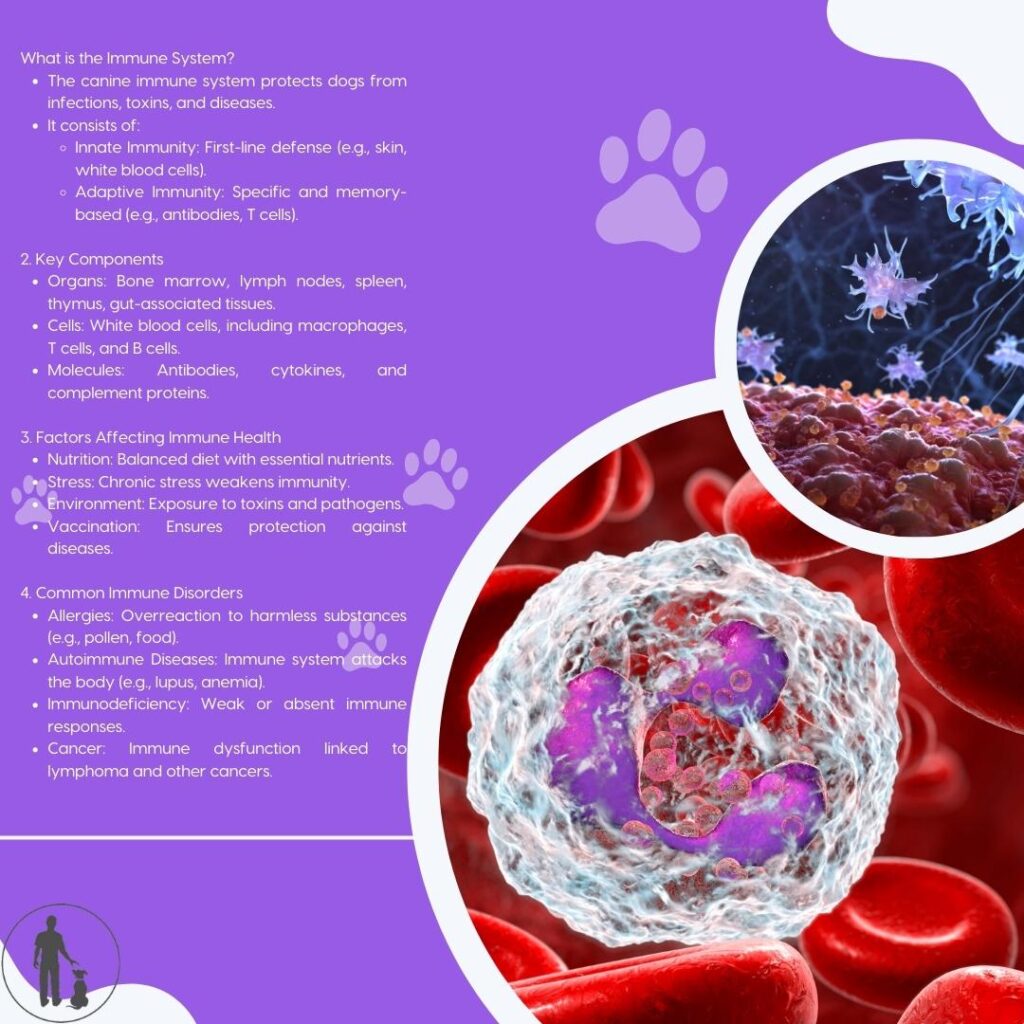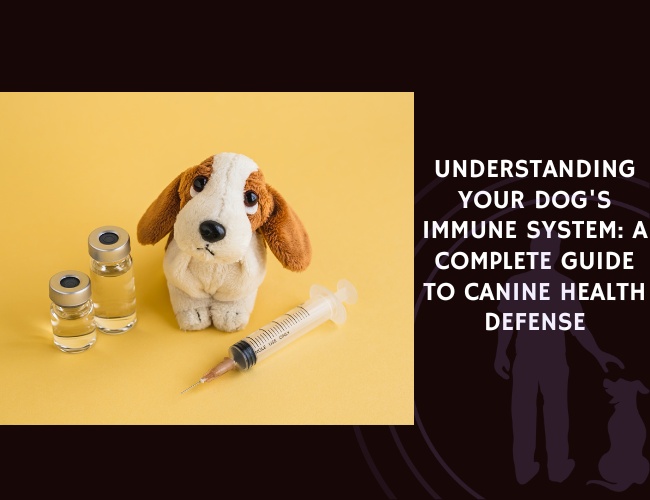Introduction to the Canine Immune System
Welcome to our deep dive into the canine immune system! Understanding your dog’s immune system is vital for ensuring their well-being. In this chapter, we’ll discuss the primary purpose of the immune system, explore the two main types of immunity, and identify the key organs involved in immune function.
Definition and Primary Purpose of the Immune System
The immune system is a complex network of cells, tissues, and organs that collectively work to defend your dog’s body against infections, toxins, and diseases. Its main goal is to identify and eliminate pathogens, such as bacteria, viruses, fungi, and parasites, while distinguishing between harmful invaders and the body’s own cells. This is critical in preventing diseases and maintaining overall health.
Overview of Innate and Adaptive Immunity Components
The immune system can be broadly categorized into two components: innate and adaptive immunity.
Innate Immunity
Innate immunity is your dog’s first line of defense. It consists of physical barriers, such as the skin and mucous membranes, which prevent pathogens from entering the body. Here are some components of innate immunity:
- Phagocytes: These cells, including macrophages and neutrophils, engulf and destroy pathogens.
- Natural Killer (NK) Cells: NK cells target and attack infected or cancerous cells quickly and nonspecifically.
- Inflammation: This response involves increased blood flow and immune cell activity at the site of an infection or injury.
Adaptive Immunity
Adaptive immunity is more specialized and involves a targeted approach:
- B Cells: These cells produce antibodies that neutralize pathogens. Antibodies are protein molecules that bind to specific antigens on the surface of pathogens to block their harmful effects.
- T Cells: These cells come in two main types. Helper T cells assist other immune cells in mounting an effective response, while cytotoxic T cells kill infected cells directly.
Unlike innate immunity, adaptive immunity has a memory component, which allows for a faster and more efficient response when the same pathogen is encountered again.
Key Organs Involved in Immune Function
Several key organs play crucial roles in your dog’s immune system:
- Bone Marrow: This is where all blood cells, including immune cells, are produced.
- Thymus: The thymus is the site where T cells mature. It is most active during the neonatal and pre-adolescent periods.
- Lymph Nodes: These small structures filter lymphatic fluid and house various immune cells that can respond to pathogens.
- Spleen: The spleen filters blood, removing old or damaged red blood cells and pathogens, and helps mount immune responses.
- Mucosal-Associated Lymphoid Tissue (MALT): MALT includes tissues in the gut and respiratory tract that play a key role in monitoring and responding to pathogens entering through these routes.
By understanding these components and their functions, you can better appreciate how your dog’s body fights off infections and stays healthy. Up next, we will explore the fascinating mechanisms behind how these immune responses actually work.
How Your Dog’s Immune System Functions
Dogs, like all mammals, have an immune system that’s incredibly adept at identifying and neutralizing invaders. To understand how this system functions, we’ll dive into the innate and adaptive immune responses and look at the crucial role of memory cells in ensuring long-term immunity.
Innate Immune Response Mechanisms
The innate immune response is like the first line of defense, always ready to repel intruders quickly and without the need for prior encounters. It’s characterized by its broad and non-specific approach.
Phagocytes
Phagocytes are remarkable cells that act as the body’s vacuum cleaners. These include macrophages and neutrophils that patrol the body, gobbling up debris, bacteria, and any foreign particles they come across. By engulfing and digesting these invaders, phagocytes help to prevent infections from taking hold.
Natural Killer Cells
Natural killer (NK) cells come into play when cells within the body become compromised by a virus or turn cancerous. NK cells can identify these rogue cells because of changes on their surface and proceed to destroy them, thereby preventing the spread of infection or tumor growth.
Adaptive Immune Response
Unlike the innate system, the adaptive immune response is highly specific and develops over time. It involves a more targeted approach to eliminating pathogens, providing a tailored response based on past encounters.
B Cells
B cells play a key role in the adaptive immune response by producing antibodies. These antibodies are proteins designed to latch onto specific antigens – the unique molecules found on the surface of pathogens. By binding to these antigens, antibodies neutralize the pathogen and mark it for destruction by other immune cells.
T Cells
T cells come in two main forms: helper T cells and cytotoxic T cells. Helper T cells assist other immune cells by releasing signaling molecules that amplify the immune response. Cytotoxic T cells, on the other hand, directly attack and destroy infected cells. This dual approach ensures a more comprehensive defense against pathogens [Revunets, 2024].
Role of Memory Cells
A fascinating aspect of the adaptive immune system is its ability to remember past infections. Memory cells, a subset of B and T cells, remain in the body long after the initial infection has cleared. These cells provide a rapid and robust response if the same pathogen tries to re-infect the body, often neutralizing the threat before it can cause significant harm [Boozer et al., 2012].
Helping your dog’s immune system function optimally involves understanding these mechanisms and supporting them through nutrition, regular exercise, and preventative healthcare. By recognizing the components and processes involved in your dog’s immune defenses, you can better appreciate the importance of maintaining their health and well-being.
Immune System Development Through Life Stages
Passive Immunity in Puppies
From the first moments of life, a puppy’s immune system is almost entirely reliant on its mother. This period is crucial for a young pup as it receives passive immunity through maternal antibodies found in the colostrum, the first milk produced after giving birth. These antibodies provide the initial shield against infections, covering the puppy during its vulnerable early weeks. It’s like inheriting a temporary but powerful protective barrier directly from mom’s immune system.
When a puppy drinks colostrum, it absorbs pre-built defense mechanisms tailored by the mother. This immediate protection includes antibodies that fight off common pathogens and keep the puppy safe from the diseases the mother has encountered throughout her life. The early days of passive immunity are essential for survival, laying the groundwork for the puppy’s own developing immune system.
Transition to Active Immunity During Growth
As the puppy grows, it gradually transitions from this passive immunity to developing its own active immune responses. This shift begins as the maternal antibodies wane around six to eight weeks of age. During this transition, vaccination plays a pivotal role.
Vaccinations introduce the puppy’s immune system to weakened or inactivated forms of specific pathogens, prompting the body’s immune cells to produce their own antibodies. This helps the puppy’s immune system learn to identify and combat these pathogens in the future. In essence, vaccines act as a training program for the puppy’s immune defenses, ensuring it’s prepared to face potential threats.
This period of building active immunity is crucial. The developing immune system must become adept at recognizing a myriad of pathogens while distinguishing them from the body’s own cells. A balanced diet rich in proteins, vitamins, and essential minerals is vital during this phase, supporting the optimal function and growth of the immune system.
Age-Related Changes and Immunosenescence in Senior Dogs
As dogs reach their senior years, typically around seven years and older, their immune systems undergo significant changes. This process, known as immunosenescence, is characterized by a gradual decline in immune function. The once robust defenses start to weaken, making senior dogs more susceptible to infections, chronic diseases, and certain types of cancer.
With age, the production and activity of immune cells decrease. For instance, T cells, which are crucial for targeted immune responses, become less effective. Similarly, the thymus, an organ essential for T cell maturation, shrinks over time. This reduction in immune capabilities necessitates extra care and proactive health measures for senior dogs.
Regular veterinary check-ups become increasingly important to monitor and manage potential health issues. Moreover, a supportive diet tailored for senior dogs, combined with regular exercise and stress reduction, can help mitigate some effects of immunosenescence. Maintaining optimal immune health in senior dogs often involves a multifaceted approach, ensuring they continue to lead happy, healthy lives despite their aging immune systems.
As our understanding of canine immune health deepens, it’s crucial to focus on supportive care throughout a dog’s life stages. Whether it’s the early days of passive immunity, the active development during growth, or managing the challenges of aging, each phase requires tailored strategies to ensure robust immune defense.
As we explore factors affecting immune health next, we’ll uncover the impact of diet, genetics, and environment on your dog’s well-being.
Common Immune-Related Health Issues
Overview of Allergies and Autoimmune Diseases
Dogs, just like humans, can experience allergies and autoimmune diseases. Allergies in dogs are often the result of the immune system overreacting to harmless substances such as pollen, food, or flea saliva. This inappropriate immune response can lead to atopic dermatitis, which manifests as itchy, inflamed skin. Signs of allergies may include frequent scratching, ear infections, and chewing paws.
Autoimmune diseases, on the other hand, occur when the immune system mistakenly attacks the body’s own cells. A common autoimmune condition in dogs is autoimmune hemolytic anemia (AIHA), where the immune system destroys red blood cells, leading to symptoms such as lethargy, pale gums, and jaundice. Early diagnosis and treatment are crucial for managing these conditions effectively.
Types of Immunodeficiency Disorders
Immunodeficiency disorders in dogs either stem from congenital issues, meaning they are present at birth, or are acquired later in life. These disorders result in a weakened immune response, making dogs more susceptible to infections. Congenital immunodeficiency disorders are often due to genetic defects that impair the production or function of immune cells. Acquired immunodeficiency might occur due to chronic diseases or prolonged medication use.
Signs of immunodeficiency can include recurrent infections, slow healing, and frequent illnesses. Veterinary intervention is essential to manage these conditions and support the dog’s immune function.
Connection Between Immune System and Cancer
An intriguing aspect of the immune system is its relationship with cancer. The immune system plays a dual role: it can both prevent and, paradoxically, contribute to cancer development. Certain immune cells are responsible for identifying and destroying cancerous cells. However, if the immune system is compromised or fails to function correctly, it can allow cancer cells to proliferate.
For example, lymphoma, a type of cancer common in dogs, is often linked to immune system dysfunction. Immunosuppressive conditions can enable cancer cells to evade immune surveillance. This complex interplay underscores the importance of maintaining a strong immune system to help prevent cancers, though there is still much to learn about these mechanisms.
While dogs’ immune systems are powerful, they are not infallible. Recognizing the signs of immune-related health issues early and seeking veterinary care can make a significant difference in your dog’s health and quality of life. Maintaining a healthy lifestyle, proper diet, and regular check-ups can help support your dog’s defenses.
Transitioning to a focus on diet, stress, and environmental factors, we’ll explore next how to ensure your dog’s immune system stays in top shape.
Factors Affecting Immune Health
Understanding the myriad factors that influence your dog’s immune health can help you take proactive measures to keep them in peak condition. From diet to stress, genetics, and environmental factors, each element plays a crucial role in your dog’s ability to fight off infections and stay healthy.
Impact of Diet, Stress, and Environmental Factors
Diet and Nutrition
A balanced diet is essential for maintaining a strong immune system. Key nutrients include:
- Proteins: Vital for the production of antibodies and the proliferation of immune cells.
- Vitamins and Minerals: Essential vitamins like C and E, along with minerals such as zinc and selenium, support various immune functions.
- Antioxidants: Vitamins C and E help reduce oxidative stress.
- Essential Fatty Acids: Omega-3 fatty acids can reduce inflammation.
Maintaining a nutritious diet helps ensure that your dog’s immune system has all the necessary components to function adequately.
Stress and Anxiety
Chronic stress can significantly suppress immune function, making your dog more susceptible to illnesses. Factors such as separation anxiety, loud noises, and significant lifestyle changes can elevate stress hormones, inhibiting the immune response.
Environmental Factors
Exposure to pollutants and unclean environments can challenge the immune system. Environmental toxins, such as pesticides and household chemicals, can have detrimental effects on your dog’s health. Keeping your dog’s living space clean and reducing exposure to harmful substances can mitigate these risks.

Role of Genetics and Breed-Specific Predispositions
Genetics play a significant role in determining the robustness of your dog’s immune system. Certain breeds have predispositions to immune-related issues:
- Autoimmune Diseases: Conditions such as autoimmune hemolytic anemia are seen more frequently in certain breeds.
- Allergies: Breeds like Labradors and Bulldogs are more prone to allergic reactions.
Understanding these genetic predispositions can help you to be more vigilant and proactive in managing your dog’s health.
Effects of Vaccination and Parasite Control
Vaccinations
Keeping vaccinations up-to-date is critical for preventing infectious diseases. Vaccines stimulate the immune system to produce antibodies and memory cells, ensuring long-term protection against specific pathogens.
Parasite Control
Regular parasite control is equally essential to maintaining immune health. Parasites like fleas, ticks, and worms can significantly weaken the immune system by depleting nutrients and causing chronic stress.
Next Steps
Understanding these factors equips you with the knowledge to better support your dog’s immune health. By focusing on balanced nutrition, minimizing stress, and addressing genetic and environmental risks, you can help ensure your dog remains healthy and resilient.
Strengthening Your Dog’s Immune System
Giving your dog every chance to stay healthy involves supporting their immune system effectively. This chapter delves into crucial strategies for boosting immune health through nutrition, exercise, and proper hygiene.
Essential Nutrients and Supplements for Immune Support
Nutrition plays a critical role in maintaining a robust immune system. Here are key nutrients that significantly support your dog’s immune health:
- Proteins: Essential for producing antibodies and immune cells.
- Vitamins and Minerals: Vitamins C and E, zinc, and selenium are known to support immune functions [Almela & Ansón, 2019; Nadat & Clark, 2024].
- Antioxidants: Vitamins C and E help combat oxidative stress.
- Essential Fatty Acids: Omega-3 fatty acids, like those found in fish oil, reduce inflammation.
- Probiotics: These promote a healthy gut, crucial for overall immune functionality.
Certain supplements can also be beneficial:
- Colostrum: Rich in antibodies and growth factors.
- Turmeric: Known for its anti-inflammatory properties.
- Medicinal Mushrooms: Mushrooms like Reishi and Shiitake can boost immune activity [Bros et al., 2019; Zhou et al., 2018].
Role of Exercise and Physical Activity
Regular physical activity is not only beneficial for your dog’s physical health, but it is also essential for their immune system:
- Enhances Circulation: Exercise improves blood and lymph circulation, which aids in immune function [Mantovani et al., 2011; Schön & Erpenbeck, 2018].
- Reduces Inflammation: Consistent activity helps lower inflammation in the body, promoting better immune responses.
- Mental Health Benefits: Exercise reduces stress, which can otherwise suppress immune activity.
Importance of Proper Hygiene and Preventative Care
Maintaining proper hygiene and ensuring regular preventative care can significantly contribute to your dog’s immune health:
- Cleanliness: Regular grooming and maintaining a clean living environment help reduce exposure to pathogens.
- Vaccinations: Keeping vaccinations up to date is critical for preventing infectious diseases and supporting immune health.
- Routine Veterinary Check-Ups: Regular visits to the vet are essential for early detection and management of any immune-related issues.
By focusing on these aspects—nutrition, exercise, hygiene, and preventative care—you provide a strong foundation for your dog’s immune health and overall well-being.
Next, we will explore how dogs exhibit signs of immune system problems and the importance of regular health monitoring.
Signs of Immune System Problems
As a dog owner, it’s important to be aware of the signs that may indicate your dog’s immune system is compromised. Timely detection and action can make a significant difference in addressing potential health issues.
Common Indicators of Compromised Immunity
Understanding the early signs of a weakened immune system in dogs is crucial. Here are some common symptoms to watch for:
- Frequent Infections or Illnesses: If your dog gets sick often or takes a long time to recover, it could be a sign of an impaired immune system. Recurrent ear infections, skin infections, or respiratory issues are red flags.
- Chronic Inflammation: Persistent inflammation, such as red, irritated skin, or ongoing gastrointestinal issues, might indicate that your dog’s immune response is overactive or misdirected.
- Slow Wound Healing: If cuts, scrapes, or surgical wounds take longer to heal than usual, it may signal an underlying issue with immune function.
- Lethargy: Generalized fatigue and lack of energy can be symptoms of various health problems, including immune system deficiencies.
- Allergies: Constant scratching, biting, or licking, and chronic ear infections can be symptomatic of an allergic response, which is related to immune system overactivity.
When to Seek Veterinary Attention
If any of the above symptoms persist, it’s time to consult your veterinarian. Here are specific scenarios that warrant immediate veterinary attention:
- Persistent or Recurrent Infections: More than two infections in a short period, or infections that don’t respond to standard treatments, require professional evaluation.
- Severe Allergic Reactions: Signs of a severe allergic reaction, such as facial swelling, difficulty breathing, or sudden onset of diarrhea and vomiting, need urgent care.
- Unexplained Weight Loss or Changes in Appetite: Significant weight loss or a marked decrease in appetite are concerning and should be investigated promptly.
- Extreme Fatigue or Weakness: If your dog seems unusually tired or has trouble engaging in regular activities, a vet visit is necessary.
Importance of Regular Health Monitoring
Regular health check-ups are essential for early detection and management of immune system issues. Here’s why:
- Routine Blood Work: Regular blood tests can help spot abnormalities in white blood cell counts and other markers that indicate immune function.
- Preventive Care: Scheduled vaccinations, parasite control, and prompt treatment of infections help keep the immune system strong and responsive.
- Monitoring Chronic Conditions: If your dog has a diagnosed condition, consistent follow-up can ensure that it is well-managed and that potential complications are addressed early.
- Behavioral Observations: Regularly observing your dog’s behavior and noting any changes can help identify issues early on. Keeping a health journal can be useful during veterinary visits.
Understanding these aspects of your dog’s health helps you to act decisively in maintaining their well-being. Proactive health monitoring ensures that your furry friend lives a happy and healthy life, free from the burdens of immune-related complications.
Future of Canine Immune Health
Emerging Research in Gut-Immune Connection
In recent years, there’s been a significant surge in research exploring the gut-immune connection. The gut microbiome, teeming with an array of bacteria, viruses, and fungi, plays a pivotal role in regulating the immune system. Studies have shown that a balanced gut microbiota can enhance immune responses, while imbalances (dysbiosis) can lead to inflammatory and autoimmune conditions.
For instance, certain probiotics can boost gut health, which in turn supports immune function. Good bacteria in the gut help to crowd out pathogenic organisms and maintain an environment that discourages infectious agents. By fostering a healthy gut microbiome through diet and supplements, you can significantly enhance your dog’s immune resilience.

Advances in Immunotherapy Treatments
Immunotherapy represents a promising frontier in veterinary medicine. This treatment modality seeks to harness and enhance the innate power of the immune system to fight diseases, particularly cancers, and autoimmune diseases.
A prime example is the use of monoclonal antibodies, which are designed to target and neutralize specific antigens. For instance, canine lymphoma, a common cancer linked to immune dysfunction, is being tackled using such cutting-edge treatments. Additionally, immunotherapies are being developed to modulate immune function in cases of autoimmune diseases, offering new hope for conditions that previously had limited treatment options.
Developments in Personalized Immune Care Approaches
Personalized medicine, tailored to the individual needs of each dog, is set to revolutionize how we approach canine immune health. By understanding a dog’s genetic predisposition to certain immune-related disorders, veterinarians can develop more effective, bespoke treatment plans.
Studies are making headway into genetic profiling, which helps identify breed-specific immunity challenges. For instance, identifying a Labrador Retrievers’ higher susceptibility to atopic dermatitis means pre-emptive measures can be taken before symptoms arise.
Furthermore, personalizing vaccination schedules, diet plans, and environmental interventions can lead to more effective prevention and management of immune-related conditions. This bespoke care approach ensures that each dog receives the most appropriate care for their unique immune needs.
Understanding the fast-evolving landscape of canine immune health equips us to provide better care and preventive strategies for our furry friends. The next steps we take can profoundly impact the overall well-being and longevity of our pets. Let’s continue to explore how we can best support the immune systems of our beloved dogs.










